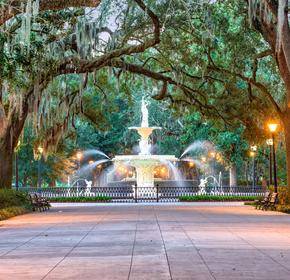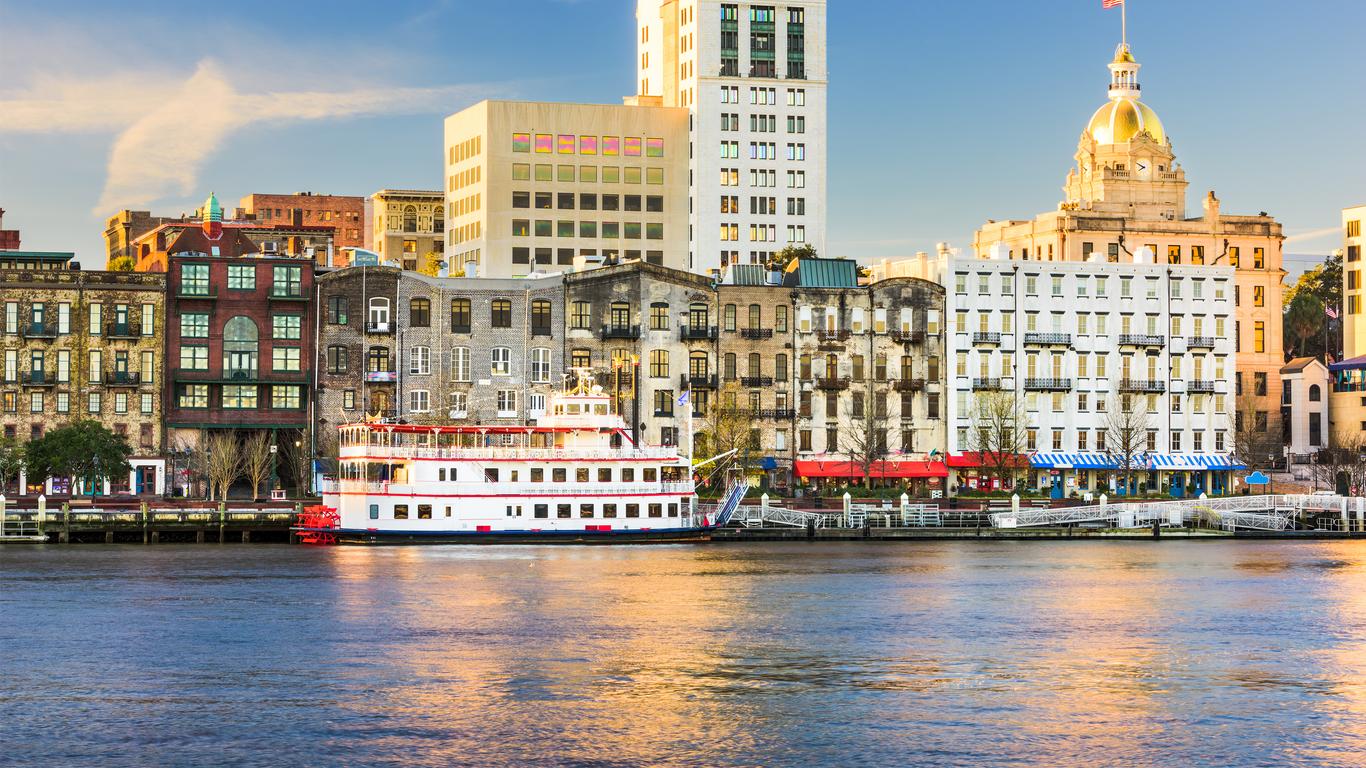
Savannah travel guide
Savannah Tourism | Savannah Guide
You're Going to Love Savannah
This gorgeous city in eastern Georgia seems to have hardly changed since the mid-19th century, when it was one of the richest places in the world.
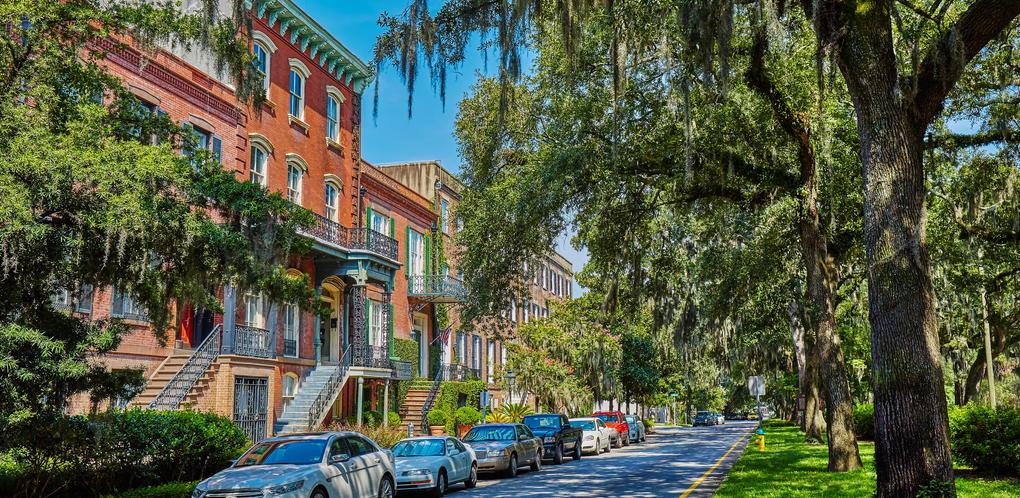
Nowadays, Savannah is more than just a time machine, although wandering the streets and seeing beautiful buildings like the Davenport House is an enchanting experience. It’s also a welcoming, vibrant cultural center. Every April, American artists converge on the city to fill the bars and parks with music, and every week there are concerts and cabaret performances to enjoy.
The chefs of Savannah are another great attraction. If you love barbecue cooking, there’s no better culinary destination. Dine on award winning ribs and chops at Wiley’s or check out other local favorites like B’s Crackling BBQ and Wall’s.
The blend of historical architecture, living culture, and fantastic food makes Savannah a seductive destination for anyone’s next weekend getaway.
Top 5 Reasons to Visit Savannah
1. Architecture
Savannah is one of America’s most beautiful cities. In the 18th and 19th centuries it rose to become one of the South’s richest places, resulting in a huge array of beautiful houses and public buildings. Check out highlights such as the Pink House (built in 1771) or Davenport House.
2. Food
Southern cooking stretches from BBQ to cornbread and freshly caught seafood – and you can find all of it in Savannah. There are world-class BBQ restaurants like Wiley's Championship BBQ, and the annual Seafood Festival in May is the best time to find out why Georgia seafood is so highly rated.
3. Shopping
Savannah has a great mixture of inner city shopping precincts and conventional malls. At places like City Market, you can explore locally owned independent stores like the Candy Kitchen or Twinkle, while major names like Sak’s and J.C. Penney can be found at malls like the Oglethorpe Mall.
4. The Islands
Not far from Savannah, you can get away from it all in an island paradise. Tybee Island is less than an hour’s drive from the Historic District and has a seemingly endless, sandy beach, the ruins of Fort Pulaski, and wonderful waters for coastal kayaking.
5. Festivals
Savannah is a city of festivals, with events dedicated to Jazz (in September), folk music (October), and books (February). However, the best event for general visitors is the Savannah Music Festival, held every April. It’s one of the best ways to hear virtuoso banjo, zydeco, blues, and country artists and it’s just a great party that everyone can enjoy.
What to do in Savannah
1. Savannah Historic District: Unspoiled Antebellum Beauty
More or less just the way it was before the Civil War, Savannah's Historical District was laid out by James Oglethorpe, one of America's great urban visionaries. Unlike most US cities, historic Savannah is laid-out around a network of small squares, and it features some sublime early 19th century architecture. Highlights include the First African Baptist Church, which is one of the oldest African-American places of worship in the USA and the home of Juliette Gordon Low, founder of the Girl Scouts of America.
2. Forsyth Park: A Place to Rest, Stroll and Listen to Music
When you wander around the Historic District, you'll almost certainly happen upon Forsyth Park -- and be glad that you did. This 30-acre park is the perfect refuge from Georgia's humidity and heat. Aside from its resplendent fountain that was installed in 1858 and its immense array of flowers, Forsyth Park hosts a Saturday Farmers' Market and regular concerts during the summer. And, if you are a history fan, the park's Confederate Monument is another must-see, reflecting the city's wartime history.
3. Cathedral of St. John the Baptist: A Fitting Place to Praise the Lord
Founded by French migrants who were fleeing the Haitian Revolution in the 1790s, Savannah's Catholic cathedral was rebuilt in 1899 and is now one of the city's most beautiful buildings. Step inside and you could be in Paris or Milan. There are gorgeous vaulted ceilings, an impressive organ and stunning stained-glass windows, but above all there is a thriving community of worshippers. Attend a mass or find a seat for the cathedral's regular organ and choral concerts -- they are always special occasions.
4. Fort McAllister: A Great Insight into Civil War Conflict
Savannah's primary Civil War fortification, Fort McAllister lies about half an hour's drive south from the Historic District, and it's well worth making the trip. Built under the oversight of General Robert E. Lee, the fort was bombarded on seven occasions by Union vessels as they sought to dislodge the defenders of one of the Confederacy's major ports. But it eventually fell due to General Sherman's overland invasion in 1864. Nowadays, visitors can get a feel for the conditions experienced by its occupants, see a furnace for forging artillery shells and check out the museum -- or they can just camp, fish or relax in the State Park by the Ogeechee River.
5. Old Fort Jackson: Have a Blast and Take Some Beautiful Vacation Snaps
Much closer to the center of Savannah, Old Fort Jackson was another key Civil War fortification. This time made from brick, not earth, it was built well before the war by Thomas Jefferson but saw its glory days as Confederates sought to defend Savannah against the Union. Restored in the 1970s by the city authorities, Fort Jackson is more than a relic. Staff put on daily cannon firings, and the fort offers some of the best views of historic Savannah of anywhere on the bay.
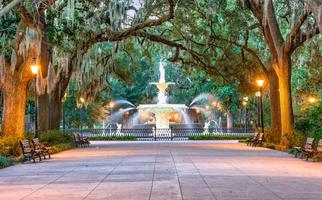
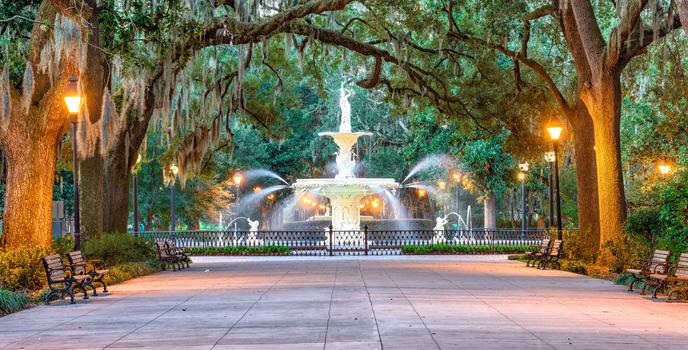
1. Savannah Historic District: Unspoiled Antebellum Beauty
More or less just the way it was before the Civil War, Savannah's Historical District was laid out by James Oglethorpe, one of America's great urban visionaries. Unlike most US cities, historic Savannah is laid-out around a network of small squares, and it features some sublime early 19th century architecture. Highlights include the First African Baptist Church, which is one of the oldest African-American places of worship in the USA and the home of Juliette Gordon Low, founder of the Girl Scouts of America.
2. Forsyth Park: A Place to Rest, Stroll and Listen to Music
When you wander around the Historic District, you'll almost certainly happen upon Forsyth Park -- and be glad that you did. This 30-acre park is the perfect refuge from Georgia's humidity and heat. Aside from its resplendent fountain that was installed in 1858 and its immense array of flowers, Forsyth Park hosts a Saturday Farmers' Market and regular concerts during the summer. And, if you are a history fan, the park's Confederate Monument is another must-see, reflecting the city's wartime history.
3. Cathedral of St. John the Baptist: A Fitting Place to Praise the Lord
Founded by French migrants who were fleeing the Haitian Revolution in the 1790s, Savannah's Catholic cathedral was rebuilt in 1899 and is now one of the city's most beautiful buildings. Step inside and you could be in Paris or Milan. There are gorgeous vaulted ceilings, an impressive organ and stunning stained-glass windows, but above all there is a thriving community of worshippers. Attend a mass or find a seat for the cathedral's regular organ and choral concerts -- they are always special occasions.
4. Fort McAllister: A Great Insight into Civil War Conflict
Savannah's primary Civil War fortification, Fort McAllister lies about half an hour's drive south from the Historic District, and it's well worth making the trip. Built under the oversight of General Robert E. Lee, the fort was bombarded on seven occasions by Union vessels as they sought to dislodge the defenders of one of the Confederacy's major ports. But it eventually fell due to General Sherman's overland invasion in 1864. Nowadays, visitors can get a feel for the conditions experienced by its occupants, see a furnace for forging artillery shells and check out the museum -- or they can just camp, fish or relax in the State Park by the Ogeechee River.
5. Old Fort Jackson: Have a Blast and Take Some Beautiful Vacation Snaps
Much closer to the center of Savannah, Old Fort Jackson was another key Civil War fortification. This time made from brick, not earth, it was built well before the war by Thomas Jefferson but saw its glory days as Confederates sought to defend Savannah against the Union. Restored in the 1970s by the city authorities, Fort Jackson is more than a relic. Staff put on daily cannon firings, and the fort offers some of the best views of historic Savannah of anywhere on the bay.


Where to Eat in Savannah
Savannah is one of the best dining cities in the south, and gourmet food fans will find it hard to choose where to eat. If you love meat, Wiley's Championship BBQ is a must-visit, and regularly wins awards for its beef and chicken dishes. The Olde Pink House is an elegant eatery that serves southern dishes like soft shell crab, while Mrs Wilkes’ Dining Room provides a warm welcome and massive portions of southern home cooking.
When to visit Savannah
Picking the right time to visit Savannah can make a big difference to your vacation. Try to avoid high summer (August) when the humidity soars. Instead, arrange a late spring trip (anytime from March to July is good). That way, you can catch the beautiful azaleas in full bloom, get the best of the weather and attend events like May’s Savannah Seafood Festival.
How to Get to Savannah
Plane
Savannah’s Hilton Head Island International Airport provides connections to a wide range of American cities, including New York, Washington D.C., Chicago, and Atlanta. Chatham Area Transit operates an Airport Express bus (route 100X) which costs $5. Many of Savannah’s major hotels also offer shuttles from the airport, but if a shuttle isn’t available, you can also catch a taxi or rent a car. Expect to pay around $30 to get to the city center.
Train
Savannah’s Amtrak station is located at 2611 Seaboard Coastline Dr and is on two major passenger routes. The Palmetto service links Savannah to New York City, while the Silver Service connects it to Florida to the south.
Car
If you are driving from the north or south, the coastal I-95 is the best route into town. For those coming from the west, I-16 meets I-95 a few miles from Savannah, so the city has good connections to the rest of the country.
Bus
Greyhound operates regular intercity bus services into their stop at Oglethorpe Ave from major cities like Baltimore, Atlanta, and Miami. The stop is conveniently situated in the historic city center, so it’s a good option for those staying in Downtown hotels.
Airlines serving Savannah
Where to stay in Savannah
The Historic District – Savannah’s history dates back to 1733, making it one of the South’s oldest cities, and the Historic District next to the Savannah River is home to most of the city’s period buildings. See the home of writer Flannery O’Connor, beautiful 19th century homes like the Isaiah Davenport House, and dine at local institutions like 39 Rue de Jean.
Popular Neighborhoods in Savannah
Hillcrest/Savannah Gardens – An up-scale district to the east of the city center, Hillcrest is where Savannah’s elite make their homes. Not surprisingly, it’s home to Savannah Golf Club, as well as plenty of places to eat. If you plan to travel with your family, it’s a conveniently located, safe, and elegant area to stay.
Forsyth Park – Just to the south of the Historic District you’ll find Forsyth Park. Savannah’s major inner city green space, Forsyth Park is in an area packed with upscale B&Bs like The Confederate House, great southern food restaurants like 700 Drayton, and historic attractions, including the Mercer Williams House, which featured in the movie Midnight in the Garden of Good and Evil.
Where to stay in popular areas of Savannah
Most booked hotels in Savannah
How to Get Around Savannah
Public Transportation
Public transportation in Savannah is mainly provided by Chatham Area Transit, who have their main hub at W. Oglethorpe Ave, so if you head there you should be able to catch buses to all other parts of the city. Basic local fares are $1.50 per journey and weekly passes cost $14.
Taxis
Generally, taxis in Savannah charge a meter drop of $2 for the first sixth of a mile, then $0.30 for every subsequent sixth of a mile ($1.80 per mile). Uber is also active in the city, and have a base fare of $1, then $0.85 per mile after that.
Car
Parking can be an issue in central Savannah, but if you look around you should find a space somewhere. The first place to look is the 1,100 car garage underneath Ellis Square.
The Cost of Living in Savannah
Shopping Streets
City Market is one of the best places to shop in Savannah. Located within two blocks of the Historic District, it’s full of independent clothing boutiques, wine stores, shoe stores, and food outlets. If you want to shop at big name stores like Sak’s, Old Navy, and J.C. Penney, the Oglethorpe Mall is the place to go, while good places to window shop for apparel include Chippewa Square and W Broughton Street.
Groceries and Other
Savannah has an average cost of living relative to most U.S. cities, but it’s much cheaper than New York or San Francisco. Expect to pay around $12 for a bottle of wine or $2.70 for a pound of apples. Good places to shop for groceries include supermarkets like Kroger, Kmart, and Chu’s, while Savannah State Farmers Market in Chatham City is a good place to head for fresh fruit and vegetables.
